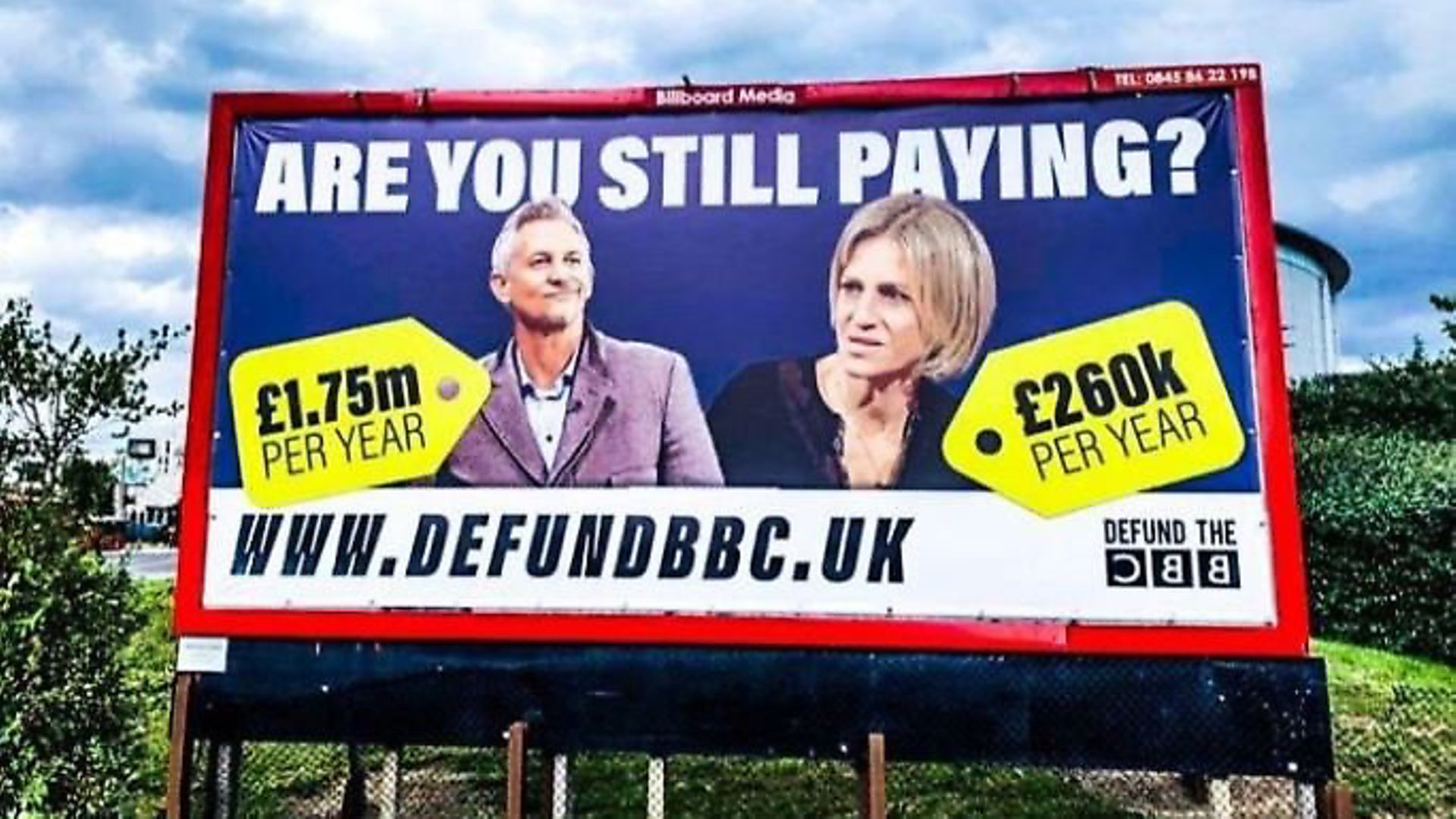
STEVE ANGLESEY considers whether the Brexiteers’ latest fight with the corporation is an attempt at revenge over what they see as Remain bias.
If you liked Brexit, you’re going to love its sequels. Pre-production work on one of them began in mid-July on what its organisers describe as ‘one of the busiest roads in London’, when a billboard went up featuring a smug-looking Gary Lineker, a surprised-looking Emily Maitlis, their respective pay packets and the simple message: ‘Are you still paying?’ Below was a tagline carrying the point of the exercise: ‘Defund the BBC’.
This anti-Auntie campaign is ostensibly the creation of Glasgow University history student James Yucel, and ostensibly it aims ‘to decriminalise non-payment and reduce the scope of the licence fee so that it only covers BBC content’. Will the Defunders be happy achieving just those two outcomes though? For as they are well aware, the more you remove the BBC’s means of raising revenue, the less able the BBC is to produce content. And in this case, the Defunders hope it will be the kind of content they don’t like, created by people whose political views they oppose.
It’s no surprise to see Lineker, who vociferously supported Remain, on the billboards. Nor is it a surprise to see the Defunders targeting Maitlis, who missed an episode of Newsnight in May following her monologue criticising the government’s handling over Dominic Cummings’ revolutionary optometry experiment in Barnard Castle. In a YouTube video launching his campaign, Yucel protested that, ‘Ultimately the BBC is not impartial, they regularly fail to introduce guests with their political background, they accidentally edit footage that makes the government look worse than they actually are, and yeah, I think the people have had enough really.’
So who are Yucel’s colleagues in the Defund The BBC campaign? The press officer is Liam Deacon, who worked in the same capacity on the Brexit Party’s 2019 general election campaign (slogan: ‘run away, run away’) and before that worked at alt-right website Breitbart London, where in the 14 months before the referendum he published 450 stories about immigration, migrants or Islam.
Campaign champions include Darren Grimes, whose interview with David ‘so many damn blacks’ Starkey will no doubt be held up as an example of the kind of journalism a defunded BBC could produce if only it dared. Another content champion is Calvin Robinson, who recently told Spiked that: ‘Anything that doesn’t fit the liberal, metropolitan perspective of the BBC is disregarded… The BBC seems to have become an outlet for woke propaganda.’ His examples of shows which offer this diet of leftist tripe included Doctor Who and Countryfile.
Robinson, a teacher, felt similar about the education system in 2016, when after the referendum he professed to be ‘not at all surprised that the majority of young people voted in line with a left wing agenda to remain in the undemocratic, or even anti-democratic European Union… Schools have been grooming children towards this decision for years.’
Strange how it all comes back to Brexit, isn’t it? The candidates, the press officer, the campaigner. Even Defund The BBC’s campaign co-ordinator Rebecca Ryan is a veteran of Stand Up 4 Brexit, the unsuccessful quest to find a pro-Leave comedian able to draw more laughs than Mark Francois can just from standing there being Mark Francois.
So is Defund The BBC just a revenge strike on behalf of what they see as pro-Remain bias before and after the referendum? ‘The Defund the BBC campaign is not connected with Brexit, the 2016 voting preferences of the team are therefore irrelevant,’ a spokesperson told us. They’re concerned instead, they say, with the fact ‘one in 10 court cases in the UK concerns non-payment of the TV licence fee, and 70% of those prosecuted are women. It disproportionately affects the poor in our society.’
They add that the key driver for the campaign is not post-Brexit rage but that: ‘The BBC is reneging on its commitment to fund free TV licences for the over-75s, which comes into force from August 1. What better time to focus on this issue?’ Given that it was the government that decided to stop paying the BBC to fund this, effectively forcing their hand, it’s a rotten line of attack. But it’s working – so far Defund The BBC has raised just under £45,000 in just under a month, with an aim to get to £100,000 and produce more billboards ‘across the country – soon’.
Does all this mean James, Darren, Liam and pals are dodging the detector vans? The spokesperson said: ‘It would be unusual to work on a campaign focused on an organisation and yet not view and monitor its output. The BBC requires a licence fee to watch its output, therefore the entire team have paid for their TV licences for work purposes.’
But if they are successful, perhaps there will be no need to pay for much longer – and if arts programmes should be cut and the World Service closed, what’s all that against Doctor Who no longer being woke?
If you really do want to defund the BBC, their website is at www.defundbbc.uk
Warning: Illegal string offset 'link_id' in /mnt/storage/stage/www/wp-includes/bookmark.php on line 357
Notice: Trying to get property 'link_id' of non-object in /mnt/storage/stage/www/wp-includes/bookmark.php on line 37







